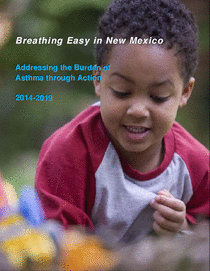Breathing Easy in New Mexico
A Five Year Plan to Reduce the Asthma Burden

The New Mexico Council on Asthma (NMCOA) and the New Mexico Department of Health are pleased to announce the recent publication of a five-year plan to be used as a guide to reduce the burden of asthma and improve asthma outcomes in New Mexico. The plan, Breathing Easy in New Mexico: Addressing the Burden of Asthma through Action 2014-2019, outlines four goal areas designed to enhance asthma care for New Mexicans in the next five years.
The goals address the following:
- Coordinating data sharing and efforts among organizations.
- Promoting the use of national asthma guidelines to healthcare providers.
- Reducing asthma hospitalization rates and regional and ethnic disparities in asthma health outcomes through educational programs aimed at patients, families, schools, and communities.
- Creating and supporting legislative advocacy for school based health reform to address emergency situations.
The NMCOA is a coalition of healthcare organizations dedicated to reducing the disease burden by making significant improvements to the care provided to people with asthma.
In New Mexico, asthma affects nearly 200,000 people, one quarter of who are children.
Approximately 9.6 percent of adults 18 years of age and older and 9.0 percent of children 17 years of age and younger currently have asthma. This equates to about 150,000 adults and 47,000 children in New Mexico who currently have the disease. Although best-practice guidelines for treatment of asthma have been established, adherence to them remains poor. As a result, many people with asthma do not have control over their disease and are at an increased risk for emergency department visits, hospitalizations, and missed school and work days. The direct costs due to poorly-controlled asthma (in the form of hospitalizations, emergency department visits and emergency medications) are substantial.
“The plan developed by the NMCOA, in partnership with New Mexico Department of Health, serves as a guide to collaborate with health care providers, disease prevention advocates, schools and communities statewide to encourage the use of national best practice asthma guidelines,” said Department of Health Secretary Retta Ward, MPH. “Using best practices is critical to reducing preventable complications from chronic diseases such as asthma.”
Best practices for treatment of asthma include:
- Assessing for severity and monitoring for control of asthma
- Education for a partnership in asthma care
- Control of environmental factors and co-morbid conditions that affect asthma
- Pharmacologic therapy
The complete plan can be found in the Asthma section of our website.
Media Contact
We would be happy to provide additional information about this press release. Simply contact David Morgan at 575-528-5197 (Office) or 575-649-0754 (Mobile) with your questions.

